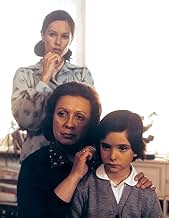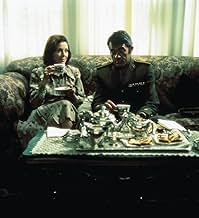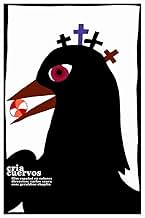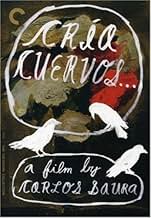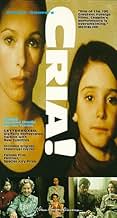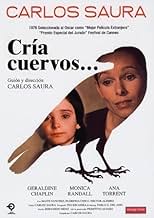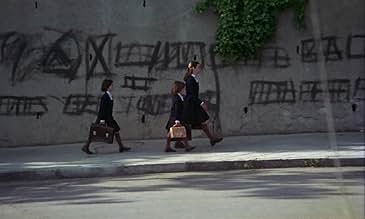VALUTAZIONE IMDb
7,9/10
11.930
LA TUA VALUTAZIONE
Nel crepuscolo della dittatura di Francisco Franco, un'orfana di otto anni e le sue due sorelle trovano rifugio nella casa della loro severa zia e fanno il possibile per acclimatarsi a una n... Leggi tuttoNel crepuscolo della dittatura di Francisco Franco, un'orfana di otto anni e le sue due sorelle trovano rifugio nella casa della loro severa zia e fanno il possibile per acclimatarsi a una nuova realtà. Avranno il coraggio di sopravvivere?Nel crepuscolo della dittatura di Francisco Franco, un'orfana di otto anni e le sue due sorelle trovano rifugio nella casa della loro severa zia e fanno il possibile per acclimatarsi a una nuova realtà. Avranno il coraggio di sopravvivere?
- Regia
- Sceneggiatura
- Star
- Premi
- 8 vittorie e 4 candidature totali
Conchita Pérez
- Irene
- (as Conchi Perez)
Mayte Sanchez
- Maite
- (as Maite Sánchez)
Mónica Randall
- Paulina
- (as Monica Randall)
Josefina Díaz
- Abuela
- (as Josefina Diaz)
Germán Cobos
- Nicolás Garontes
- (as German Cobos)
Héctor Alterio
- Anselmo
- (as Hector Alterio)
Julieta Serrano
- Ana
- (voce)
Recensioni in evidenza
This film is such a splendid experience that it's difficult to really describe objectively why. The plot, the characters are revealed at a perfect tempo, keeping the audience engrossed and anticipating what's next. Any film with such sparse dialogue needs to make the rare lines worthwhile, and Saura certainly does, probably learning from Erice, the master of indispensable dialogue. Ana Torrent invites all sorts of Erice comparisons, but I see Saura taking a step beyond him here visually.
"Beehive" was a landmark film, and unlike anything that had been made. But the camera maintained the same distance and the story was fundamentally allegorical. Saura experiments with distance, sometimes following the characters closely, sometimes giving an omniscient birds eye view of the area. Sometimes remaining a mere witness to what's happening. It's very carefully calculated to best enhance the scene and keep these extraordinary events within the realm of possibility.
If there's such a film as a director's film, this is it. Although it is certainly worthwhile for the performances as well.
5 out of 5 - Essential
"Beehive" was a landmark film, and unlike anything that had been made. But the camera maintained the same distance and the story was fundamentally allegorical. Saura experiments with distance, sometimes following the characters closely, sometimes giving an omniscient birds eye view of the area. Sometimes remaining a mere witness to what's happening. It's very carefully calculated to best enhance the scene and keep these extraordinary events within the realm of possibility.
If there's such a film as a director's film, this is it. Although it is certainly worthwhile for the performances as well.
5 out of 5 - Essential
Told through the perspective of a young child - and her older self - and interweaving past, present and future, but also includes imagined and surreal scenes, albeit staged so masterfully that it all remains stringent and comprehensible and the political implications are apparent; again, Geraldine Chaplin convinces in a double role (as the mother and as the adult child.)
10zetes
A perfect sister film to one of my absolute favorites, Spirit of the Beehive. It also stars Ana Torrent and has similar themes. And I like it probably as much. Torrent, three years older but looking pretty much the same, plays the middle child of three girls. At the beginning of the film, their father has just died. Their mother (played by Geraldine Chaplin) died a while back. The film is told through the mind of Ana, who is still mourning her mother, and she often sees her. It can be confusing at the beginning. Chaplin also appears as the adult Ana, who narrates some of her thoughts, or possibly as what Ana believes she will become. This is very ambiguous. The girls' aunt Paulina is now taking care of them. The duty was kind of forced upon her and, while she's trying her hardest, it's taking its toll. She's stern and not well liked by the girls, especially Ana. There isn't much plot, per se, and what little there is shouldn't be ruined. We often see Ana's imagination and memories come to life. We see her witness fights between her parents. Later on, she reenacts them with her sisters. The film is about what children observe, how they interpret it and how they act on those interpretations. The film also has political ramifications, subtle ones that are pretty difficult to grasp. The title is the beginning of a Spanish proverb that goes: "Raise ravens, and they'll tear out your eyes." Like Spirit of the Beehive, the film depicts a child experimenting with her own cruelty and violence. Supposedly this is all a criticism of the Fascist government (Franco had just died by this point, so his regime was just on its way out). It's a very dense and fascinating movie. You'd probably still be swimming through its mysteries on a hundredth viewing. If you thought possibly that Ana Torrent was not acting in Spirit of the Beehive, this will set you straight. Her blank, soulful expression is here in full force, of course, but here you see the slightest smile creep across her face, and you can just tell exactly what she's thinking. I'm afraid I've done an awful job reviewing Cría Cuervos. I haven't expressed how touching it is when dealing with Ana's loneliness (there's a scene where she dreams that her mother pops into her bedroom to tell her a story that's just heartbreaking), or how it often straddles dark comedy, like the scenes between Ana and the maid. I think that difficulty in reviewing it shows just how layered and confounding the film is. It shoots right up my favorites list. It's easily the best film I've seen all year. Bravo to Criterion for bringing this one to DVD. Hope they also get to Saura's La Caza sometime in the future.
I have seen several thousand films in my life and this one became the top one almost instantly. Ever since I have watched it several times and it has never failed to impress and delight me - it even increases the sense of mystery undelying in its baroque and compelling history. On my opinion, it is Carlos Saura's masterpiece and perhaps the best film ever made about the mysterious inner world children live in and create. There is so much to be enjoyed in this film, that a conventional review will not make it justice.
Ana (Ana Torrent), a sad-eyed little girl of about eight years old, unable to sleep, overhears a conversation as she walks down the stairs to get a glass of water. The voices, coming from her father Anslemo's (Hector Alterio), room, are exchanging expressions of mutual love. Ana hears the gasp of a man's voice crying that he is suffocating and then silence. A woman that she recognizes as Amelia (Mirta Miller), the wife of army officer Nicolás (Germán Cobos), her father's best friend, hurriedly leaves the room and heads for the front door, her blouse still unbuttoned. When the girl goes into her father's room, he is dead. She calmly takes the almost-emptied glass of milk next to his bed and washes it in the sink, then carefully puts it back on the kitchen rack.
It's title derived from the Spanish proverb "Raise ravens and they'll take your eyes," Carlo's Saura's haunting Cria Cuervos is a masterful insight into the mind of a little girl traumatized by the death of both of her parents. We see events from Ana's perspective and its fragmented view of an imaginative but angry and resentful child is a mixture of fantasy and reality that is often hard to separate. The film is also seen by some as an allegory for the mindset of the dying days of the Franco dictatorship. Whether it is viewed as a political statement or not, Cria Cuervos' evocation of the painful memories of a child whose grasp on reality is fading is masterful and deeply moving, especially given Ana Torrent's heartfelt and authentic performance.
Ana is one of three sisters. The older one is Irene (Conchita Pérez) and the younger one is Maite (Maite Sanchez). The little girl has visions of her mother talking to her, giving her advice about staying up too late, and reading stories to her in bed. Ana deeply longs for her mother (Geraldine Chaplin) who died of a painful illness before her father passed away. In voice-over we hear the adult Ana (also played somewhat confusingly by Geraldine Chaplin) recalling her memories from childhood and she has little good to say about them, saying that she remembers it being "interminably long and sad, full of fear." The children are now under the care and protection of their Aunt Paulina (Mónica Randall), who lacks warmth and affinity, and some have compared her haughty nature to the authoritarianism of the Franco government.
As a result, the children are much closer to Rosa, the family maid, who talks to them about family secrets even though much of what she says goes over their head. Also living with them in their country estate is the girls' grandmother, disabled and unable to speak who loves to look at family pictures on the wall, trying to recapture her fading memories of the past. The girls play at being adults. Irene puts on her aunt's bra and does her lashes. Pretending to be her father, Irene draws a moustache on her face while Maite wears high heels. Ana puts on lipstick as they act out their version of memories recalled from the many arguments they heard between their unfaithful father and their depressed and anxious mother.
The motif of death runs throughout the film. Ana believes she poisoned her father and fantasizes about also killing her aunt. She even mixes some baking soda in her aunt's milk, thinking it is poison. In one sequence, Ana looks down a busy Madrid street from her roof and pictures herself jumping to her death. The children also play hide-and-seek in which the one whose hiding place is discovered has to pretend to die and remain "dead" until Ana offers a prayer to her guardian angel to "revive my sisters." Although we are somewhat buoyed by the scene of the end of the summer with the girls going back to school, we are left to wonder whether the family's cynicism and negativity will carry over into the children's adult life. The adult Ana's voice-over, heard without any context, is not promising.
It's title derived from the Spanish proverb "Raise ravens and they'll take your eyes," Carlo's Saura's haunting Cria Cuervos is a masterful insight into the mind of a little girl traumatized by the death of both of her parents. We see events from Ana's perspective and its fragmented view of an imaginative but angry and resentful child is a mixture of fantasy and reality that is often hard to separate. The film is also seen by some as an allegory for the mindset of the dying days of the Franco dictatorship. Whether it is viewed as a political statement or not, Cria Cuervos' evocation of the painful memories of a child whose grasp on reality is fading is masterful and deeply moving, especially given Ana Torrent's heartfelt and authentic performance.
Ana is one of three sisters. The older one is Irene (Conchita Pérez) and the younger one is Maite (Maite Sanchez). The little girl has visions of her mother talking to her, giving her advice about staying up too late, and reading stories to her in bed. Ana deeply longs for her mother (Geraldine Chaplin) who died of a painful illness before her father passed away. In voice-over we hear the adult Ana (also played somewhat confusingly by Geraldine Chaplin) recalling her memories from childhood and she has little good to say about them, saying that she remembers it being "interminably long and sad, full of fear." The children are now under the care and protection of their Aunt Paulina (Mónica Randall), who lacks warmth and affinity, and some have compared her haughty nature to the authoritarianism of the Franco government.
As a result, the children are much closer to Rosa, the family maid, who talks to them about family secrets even though much of what she says goes over their head. Also living with them in their country estate is the girls' grandmother, disabled and unable to speak who loves to look at family pictures on the wall, trying to recapture her fading memories of the past. The girls play at being adults. Irene puts on her aunt's bra and does her lashes. Pretending to be her father, Irene draws a moustache on her face while Maite wears high heels. Ana puts on lipstick as they act out their version of memories recalled from the many arguments they heard between their unfaithful father and their depressed and anxious mother.
The motif of death runs throughout the film. Ana believes she poisoned her father and fantasizes about also killing her aunt. She even mixes some baking soda in her aunt's milk, thinking it is poison. In one sequence, Ana looks down a busy Madrid street from her roof and pictures herself jumping to her death. The children also play hide-and-seek in which the one whose hiding place is discovered has to pretend to die and remain "dead" until Ana offers a prayer to her guardian angel to "revive my sisters." Although we are somewhat buoyed by the scene of the end of the summer with the girls going back to school, we are left to wonder whether the family's cynicism and negativity will carry over into the children's adult life. The adult Ana's voice-over, heard without any context, is not promising.
Lo sapevi?
- QuizThe title in Spanish stems from the phrase "Raise ravens and they'll pluck out your eyes." The equivalent phrase in English would be "you reap what you sow."
- Curiosità sui creditiThe closing credits identify Cancion y Danzas Number 5 of Frederic Mompou. But it was definitely Number 6 that we heard.
- ConnessioniFeatured in Zomergasten: Episodio #4.1 (1991)
- Colonne sonoreCanción y Danzas N.6
Composed by Frederic Mompou (as Federico Mompou)
I più visti
Accedi per valutare e creare un elenco di titoli salvati per ottenere consigli personalizzati
- How long is Cría Cuervos?Powered by Alexa
Dettagli
- Data di uscita
- Paese di origine
- Sito ufficiale
- Lingua
- Celebre anche come
- Cría Cuervos
- Luoghi delle riprese
- 15 Calle de María de Molina, Madrid, Spagna(family house)
- Aziende produttrici
- Vedi altri crediti dell’azienda su IMDbPro
Botteghino
- Lordo in tutto il mondo
- 14.548 USD
- Tempo di esecuzione1 ora 45 minuti
- Mix di suoni
- Proporzioni
- 1.66 : 1
Contribuisci a questa pagina
Suggerisci una modifica o aggiungi i contenuti mancanti

Divario superiore
By what name was Cría cuervos... (1976) officially released in India in English?
Rispondi
